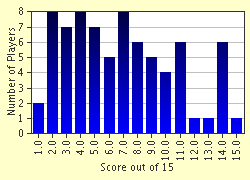Quiz Answer Key and Fun Facts
1. "There are but two sentiments to which I am constant," Lord Byron famously said, "a strong love of _____, and a detestation of cant."
2. Of all the Romantic poets, Byron most sought to overturn the old conventions and to create a new kind of poetry. He despised the neoclassical forms, and usually invented his own.
3. Byron wrote a poem called "Hints from ____" in 1811.
4. This playful satire, written in ottava rima, tells the story of a husband who returns home to his wife in the disguise of a Turk.
5. Byron claimed this poem was "a satire on abuses of the present state of Society, and not an eulogy of vice."
6. This poem was a parody of a work written by the poet laureate Southey, who had once accused Byron of being a member of the "Satanic School" of poetry.
7. This work was written after Byron became disillusioned by the French Revolution and the Napoleanic Wars. It introduced the prototypical Byronic hero--the romantic, isolated, moody protagonist.
8. This poem is about Frances de Bonivar, who was imprisoned for his religious beliefs during the Reformation.
9. Which of the following was not one of Byron's dramas?
10. These poems were written at the request of Byron's friend Douglas Kinnaird, who wished him to supply lyrics for airs adapted from the music of the synagogues.
11. Which form did Byron not employ?
12. Byron wrote this poem about Frances Webster, a woman he declined to seduce.
13. This drama, labeled blasphemous by some, met with mixed reviews. It has been admired by the conservative Sir Walter Scott, and by the Orthodox Catholic Thomas Moore. Yet the liberal Hobhouse criticized it, as did the rather heterodox William Blake.
14. If you know only one poem by Byron, it's likely you know this one. "She walks in beauty, like the ____"
15. Bob Dylan may have modeled his song, "Who Killed Davey Moore?" on Byron's poem, "Who Killed _____?"
Source: Author
skylarb
This quiz was reviewed by FunTrivia editor
Bruyere before going online.
Any errors found in FunTrivia content are routinely corrected through our feedback system.


